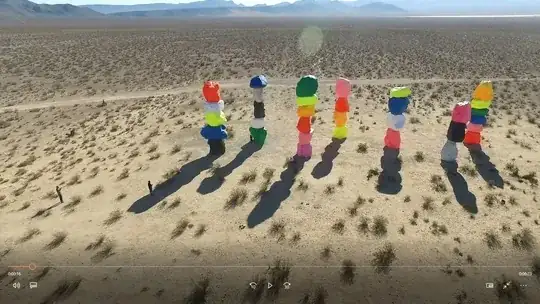Near Las Vegas is an outdoor earth art piece called Seven Magic Mountains. I have taken many photos there, the one above I took, well its a frame from a movie from my drone.
I have taken many photos there, the one above I took, well its a frame from a movie from my drone.
I am out a few weeks ago and I notice a small sign, that says photography is fine for personal use, commercial use requires written permission from...Well I will quote from the website
"Photography by visitors is permitted only for private noncommercial use. Professional photography equipment (e.g., tripods, lighting umbrellas, etc.) may not be used or brought onto the premises. Photographs taken on site may not be sold, licensed, distributed, or commercially exploited in any manner whatsoever."
So I am not a commercial photographer, how ever this policy bothered me on a number of levels. My first thought is that just because you say so, it does not mean it is so. Or in other words I think the policy is a bit of a bluff. I think I still own the photo below and any value I might gain from it would be the product of my work as the copyright owner.
So I am wondering, if someone offered me money for this picture I would then be in violation of their terms, are these terms actually binding on someone? And does someone down the line IE the artist, the company that organized/provided the funding, the US Gov(its on public land) have some claim on royalties if these pictures actually had some commercial value, like say ad revenue from a YouTube video?
I have now posted the picture on SE, a commercial venture, I also have a video on YouTube, another commercial entity, anybody have a legitimate monetary claim? Take that last question as rhetorical, I am really asking if "they" would ever have any kind of actionable copyright infringement claim on any work just because their art is in a picture?
Just to be clear:
- According to the website, the art is "public art".
- The location of the art is on public land.*
The website for the art is registered to a non-profit whom I speculate has licensing control of the art, don't know for sure, don't know if that matters.
- they use the term "premises", there is no real premises defined. The public land around the art goes for many miles in every direction, although a wildlife fence runs along the highway a few hundred feet from it, no fence encircles it, if they have authority were would their domain end?
I would like to thank Dale M for his answer, I put some questions in the comments section of his answer, I was really talking to myself Dale, not really questions I expect you should or could answer.
I have for the last few hours been looking around the net, and I was able to find the particulars of the land use that the Seven Magic Mountains are granted. They have a right of way (ROW) from BLM. This is the same ROW that the BLM grants anybody that wants to put something on BLM land like power lines, roads etc. They are renters and have no particular rights beyond permission to put the sculpture on BLM land at this location for a couple of years (and watch out for desert turtles).
Their thing about commercial photography may be a bit overstated, especially the comment that
Professional photography equipment (e.g., tripods, lighting umbrellas, etc.) may not be used or brought onto the premises.
And
Photographs taken on site may not be sold, licensed, distributed, or commercially exploited in any manner whatsoever."
According to the BLM, on BLM land one can essentially photograph rather you are a professional or amateur and there is no particular language that even implies what gear is or isn't allowed. However a permit is required for certain filming and photography, such as filming movies, commercial products and photographing in non public areas or if sets and props are involved.
clarifying memo from 2013:
https://www.blm.gov/policy/im-2013-126
It seems the BLM is interested that you do not leave a mess, trespass etc., they don't seem to have any interest in fair use and copyright or have any vested interest in protecting users of all and any types from possible infringement, guess BLM just don't think it's BLM's business. A search on the keyword "Drones" netted no results that indicated BLM had any policy that limited use of drones beyond FAA regulation.
I left one key thing out, an over site. The signs posted on site said you needed permission from Seven Magic Mountains to film or photograph for commercial use.
So let me rephrase the question a bit:
Does having a public work of art on a ROW, on BLM public land, public land with anytime public access, give one extra weight with fair use rights or to deny or allow permission to BLM allowed public uses, because one has posted a fart in the wind contention on a sign? Or a shorter version, is that website language and sign a bluff?